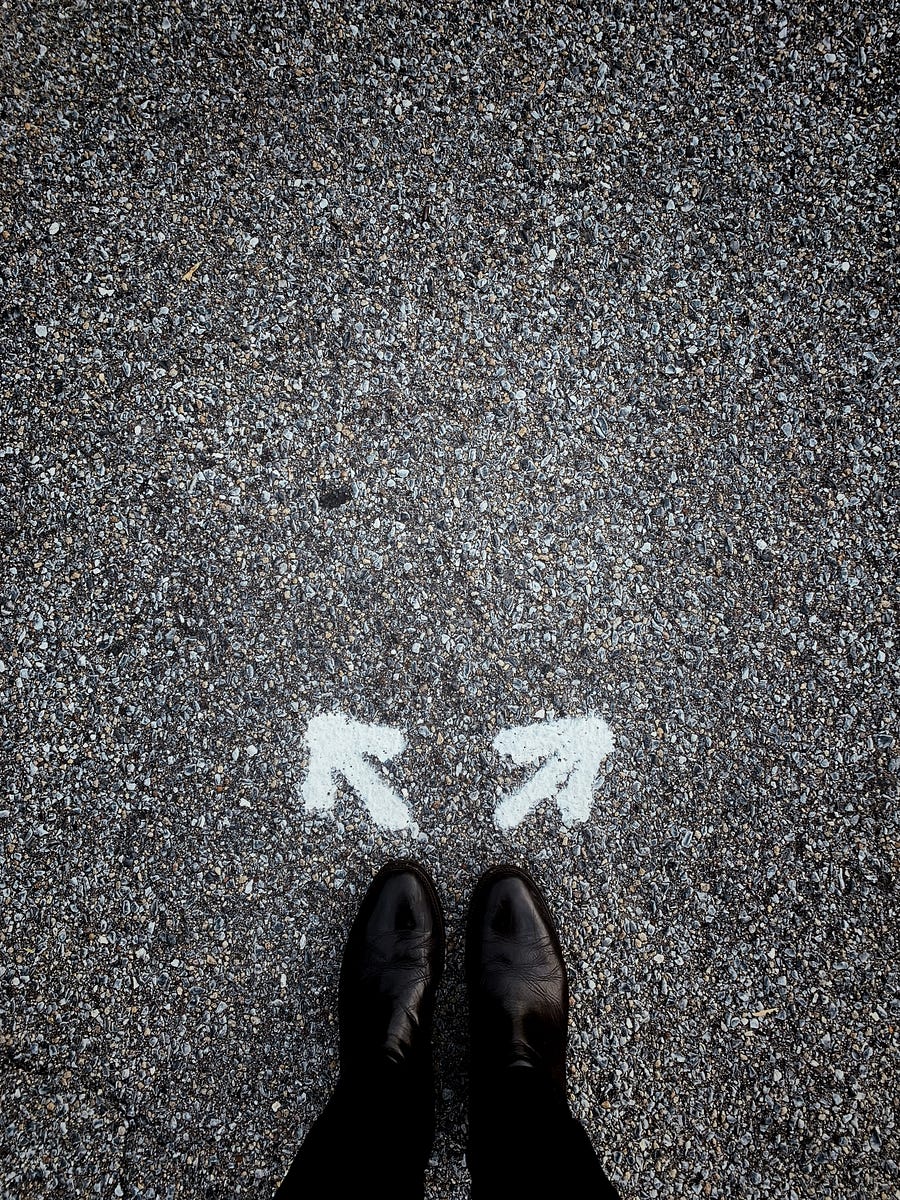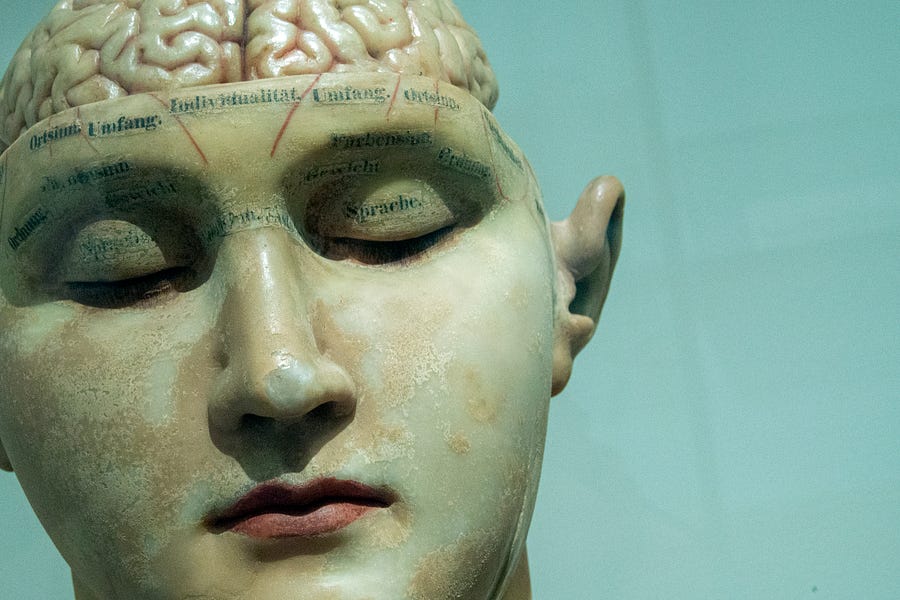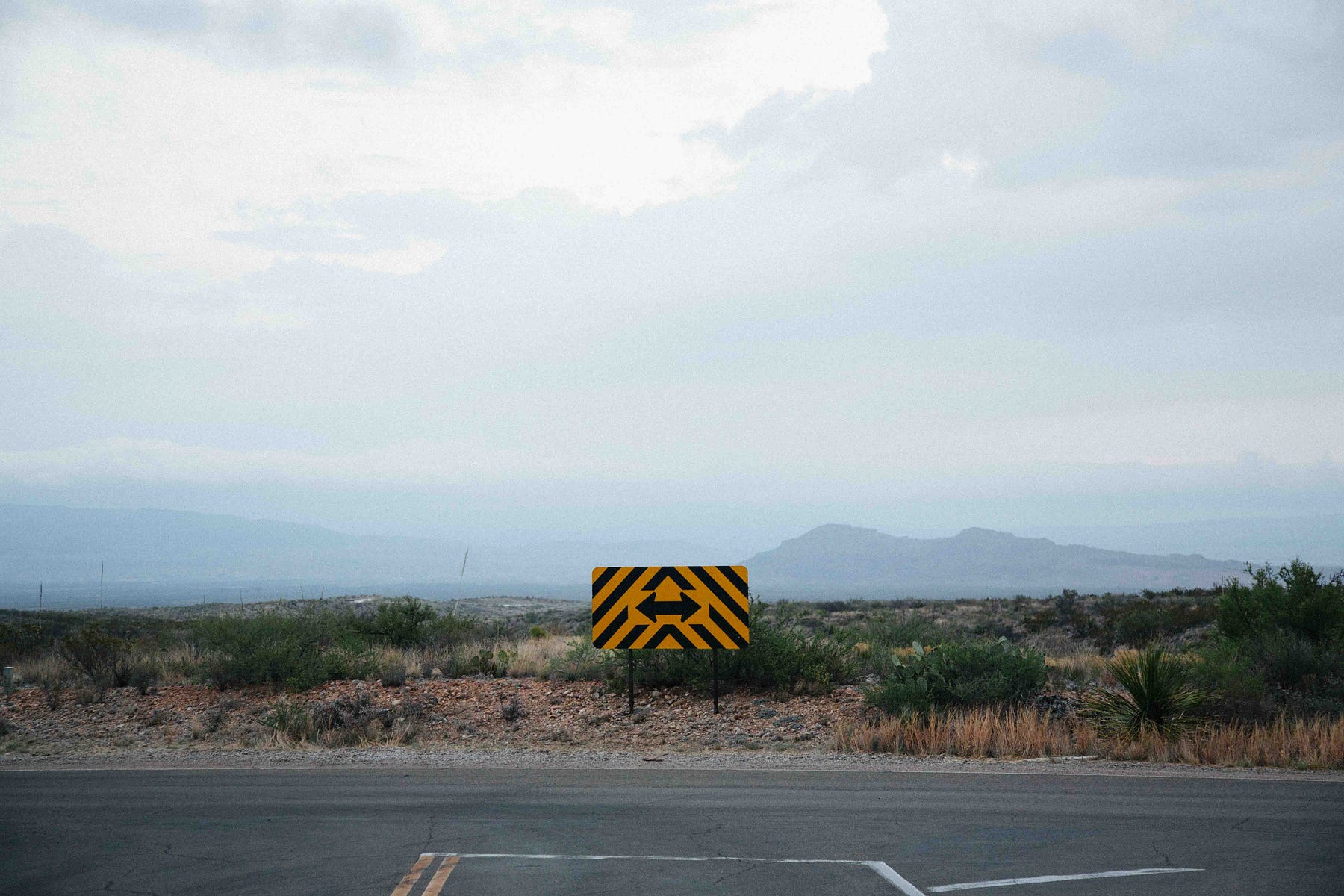Photo by Christian Erfurt on Unsplash
Confession: I am an incredibly indecisive person.
I also teach yoga and coach people on how to be better human beings. You might think that people who work in the wellness industry already have this stuff figured out…but I’m here to tell you that we don’t. We are all human, and we are all learning. Constantly.
We can, and do change, sure. But aren’t we all indefinitely a work in progress?
If you are one of those incredibly finicky, flighty, or overthinking people who just cannot decide, I’m here to tell you that you’re not alone. It’s a real thing that afflicts thousands every day. In fact, 56% of people consider themselves to be indecisive (correlated.org).

I used to suffer from crippling anxiety over every. single. choice. It didn’t matter what it was: big, life-altering decisions like which job to take or where to plant my roots next. Which guesthouse to book (the one with the better looking breakfast or the one that looks more spacious?) Even the simplest decisions like whether to order the pumpkin curry or the sweet potato fries had my stomach in knots.
It’s not so much that I didn’t know what I wanted…it’s that I was afraid of making the wrong decision. That there were “better” options I was missing out on.
I would stand at the checkout counter and literally feel the butterflies rising up and choking me from the inside, scared shitless that I would order the “wrong” thing. I overthought and second-guessed and doubted myself until I was in a near state of paralysis.
Let me spell this out for all the other sufferers of insane anxiety-inducing indecision:
1. Your gut knows what to do.
Did you know that the human species actually has three brains instead of one?
Yep, you heard me.
Three brains: Head, Heart, and Gut.
Everything changed when I learned this from an Australian body healer.
“Contrary to popular belief, we do not have one brain but three. Each of the body’s brains has unique abilities, but no one brain can operate independently of the other two. Instead, the Three Brains function interdependently, in a mutually supportive way. Once we understand that we have a Three Brain Complex and then learn how to support it, our experience of the brain transforms.”— Tapping the Three Brains, BodyTalk Systems 2017
The brain we automatically think of — the Head Brain — is like our computer. It is the problem-solving brain, and also where our great thought processes take place. It controls the autonomic nervous system. It downloads information from the external world and interprets, analyzes, and calculates.
The Heart Brain is our guiding light. It is our brain of innate wisdom and trust. It is where our passions and desires lie, the “seat of consciousness of Self”. Its primary function is to anchor the other two brains. When the Heart Brain is in balance, our actions become stress-free and enjoyable.
But the third brain — the Gut Brain — is perhaps the most fascinating of all.
Our Gut, or Enteric Brain, does much more than merely handle digestion or alarm us of potential danger. It contains an often-overlooked extensive network of over 100 million neurotransmitters that line our guts and have a direct relationship with the one in our skulls — to a great extent via the Vagus nerve — playing a key role in determining our mental state as well as overseeing our immune system.
The gut brain is the one in charge of all of our decision-making.

Intuitively, we know this to be true. Do you ever get a bad feeling in your gut when you find yourself in a dangerous situation? Or perhaps, without knowing the reason, you feel called to do something, speak to a particular person, or make a certain decision because you have a strong feeling in your gut?
That’s because your gut knows what to do.
A few years back, I was having dinner in Bali with a new friend I had met at the dive shop. He was from Germany and worked in online marketing. I happened to be telling him about my incredible “problem” with choice-making and how I struggled on a daily basis to make even the simplest of decisions. He patiently listened to me, and when I was finished, he smiled, leaned forward, and said…
“Kathryn. You already make the decision, before you make the decision.”
I still think about these words to this day.
The feeling that we get when a choice is to be made is instantaneous. It happens so quickly, before our Head Brain even has the chance to realize that we already know what we want. Before our minds chime in and give us a million reasons why we shouldn’t make said decision. This is one of the classic ways in which we experience self-inflicted, mind-made problems. We erroneously appropriate the Gut brain’s tasks to our Head brain. Our thinking minds have become the “designated driver.” Our gut makes the choice, but then we proceed to pick apart, over-analyze, and scrutinize the decision that we’ve already chosen.

[We experience the Three Brains functioning] in conflict with one another. We eloquently convey this experience when we say, ‘My head is telling me one thing, but my heart is telling me the absolute opposite’ or, ‘My gut tells me to just go for it, but my head is saying it’s a ridiculous idea. –Tapping the Three Brains
“Oh, but [x] is less expensive.” “I’ll just do [y] because it’s what everyone else is doing.” “This road or that path seems easier, I’ll just do that.” “I want to end this relationship or leave that job, but I’m already so comfortable that I’ll just stay in it.”
You already made the decision.
But until we develop an awareness of our other two brains, and learn how to listen to them, the human experience will be one of struggle.
Phew, that was a long one. The four remaining tools are more straightforward.
2. Tap back into the present.
Being indecisive often accompanies the overactive mind of many future-thinkers. We try to predict what will happen. Play out possible scenarios in our heads. Imagine the outcome, what it will be like or how things will feel.
Here’s a tip: don’t.
Observe your immediate environment right now. Notice what’s around you. How your bum feels in your seat. What the air feels like; What can I see, feel, taste? What sounds can I hear?
Close your eyes. Breathe. Notice your breath. Meditate for a minute or ten. Be the witness to your own thoughts, emotions and feelings that come up, instead of identifying with them. Go for a run. Read, write, or do whatever it is you need to do to help you relax and become present again.

My greatest moments of clarity come when I sit in stillness with my eyes closed. Or when I sit down with my tablet and start writing something completely unrelated. Half the time the answers will just come to me; and the other half of the time I just remember what I truly wanted in the first place before my ego came in and gave me a million reasons why I shouldn’t choose that [thing].
3. Ignore input, advice and suggestions from all outside sources.
This includes colleagues, friends, family, teachers, coworkers, strangers, social media posts, google map reviews, and any other external sources of potential input.
The only person that truly, truly knows what you really want is you. At the end of the day, you are the only person you have to please. You are the one you’re going to bed with at night. Nothing that anyone else says, does or suggests can change the fact that you already innately know what you want to do.
It’s just a matter of tapping into it.
This goes along with self-care, setting firm boundaries and not people pleasing. As George Ziogas put so simply in his article Why It’s Not Selfish To Put Yourself First, “Saying yes to everything can leave you in a state of anxiety. As you try to be absolutely everything to literally everyone, you make yourself ill.”
When it comes to decisions, especially important ones, there’s just no going around the fact that it’s something you’ve got to do on your own.
Trust me, you’re not being rude. You’re not snuffing anyone. You’re simply following your own Heart, your own Intuition. And more people will respect you for it.
4. There is no wrong decision.

This is the real kicker.
We choose [x], or we choose [y]. Whatever we end up choosing will produce some sort of outcome. Period. Whatever that outcome is — whether it’s a “success” or “failure” (i.e. “Dammit, I should’ve ordered the cheeseburger), is a lesson in itself. Guess what: most of the daily decisions we make that cause us anxiety are not life-threatening! You’re still alive and breathing.
You will learn from it. Next time you won’t order that thing. Or maybe you’ll choose another restaurant altogether. Or you’ll learn that you actually really dislike whatever new job or role you decided to try out. It doesn’t really matter.
It’s our Head brain that comes in and tries to label, scrutinize, and second-guess every decision. And what happens then? We self-judge. Or beat ourselves up. Which is pointless because it’s just a lesson. There is a lesson in everything: every action, reaction, decision made or step taken contains the seed of something to be learned.
So next time you get afraid of making the “wrong” decision, know that there isn’t one. You will be fine, either way.
5. The important thing is not what you choose, but it’s that you choose.
The very state of indecision is what produces the most anxiety in empaths, intuits and overthinkers. It’s the not deciding that has some people quivering with escalating stomach butterflies. The knowing that others are waiting for them to choose what they want to order. Or the battle in your mind over which road to take, whether to end a relationship or which career path to try. The self-doubt and second-guessing that eats us up on the inside when our mind comes in and lists all the pros and cons.
It’s the in-between zone. The no man’s land.
When I actually commit to deciding something, regardless of what that something is, I experience this immediate sensation of relief. It’s the feeling that comes with knowing that you don’t have to decide anything anymore.
The very act of making a decision, regardless of what that decision is, can bring you a deep sense of satisfaction.
Long story short: just choose something!
Final Thoughts:
Making decisions doesn’t have to be a battle. Since perfectionism and indecision can often go hand in hand, go easy on yourself. Settle for “good enough” instead of perfect. Life is imperfect. We will never make the “right” decision all the time.

When it comes to making choices, tap into your Gut. Do it before your thinking mind comes in. Some consideration and planning is good, but don’t think yourself into a frenzy by letting your Head brain get the best of you. If we can learn to decide quicker, we can potentially avoid unwanted unpleasant sensations that accompany a lingering state of indecision.
You’re not alone. Trust yourself. You already know what you want. And you are your own best teacher.